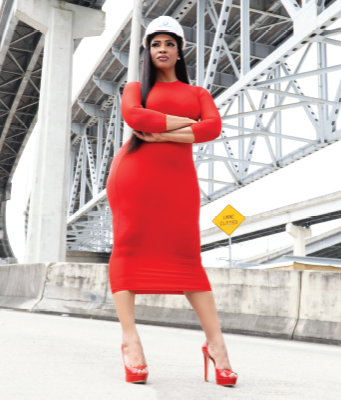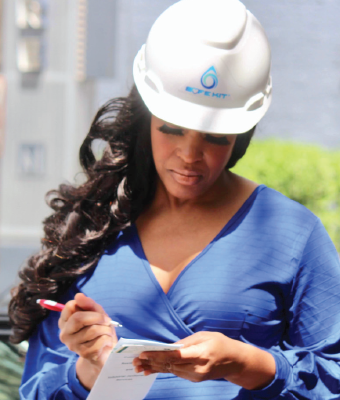Safe Kit CEO Euricka Alugas’ dedication to service has always been the driving force behind her vision. She founded Safe Kit, a 100-percent woman-owned safety staffing and training company to support the rapidly growing infrastructure in her native New Orleans.

In the aftermath of Hurricane Katrina, Alugas invented the Safe Kit “to enlighten educate, prepare, and equip residents with the essential techniques needed to survive natural disaster occurrences.” Safe Kit’s offerings encompass several areas of safety precaution and work processes, with topics including but not limited to: CPR Training, OSHA 10-30 Bilingual Training, on-site drug testing, contractor safety program revisions, and more.
Safe Kit is now working with major companies and corporations to combat any type of emergency. The company’s highly licensed and certified safety professionals impact millions, helping them return back to work and school. They work tirelessly to execute innovative ways to reach frontline workers, employers, and municipalities to bring them quality safety products and training.
Alugas cares deeply about the safety of her clients. Through her personal mantra of “safety first,” she believes in helping both workers and contractors improve safety conditions on the job and in emergency situations.
In a brief Q&A, Alugas explains the mission for her company and what it means during this pandemic.
What is Safe Kit?
ALUGAS: Safe Kit is an emergency safety supply distributor, safety staffing, and training specialist provider. We are committed and qualified to help construction companies reduce occupational injuries, illnesses, and emergencies to keep the workplace as safe as possible.
What led you to create the company?
ALUGAS: Living through Hurricane Katrina in my hometown of New Orleans in 2005, I witnessed firsthand how difficult it was for businesses to stay safe during cleanup and recovery from the disaster. This alone concerned me, and I wanted to do something to help and make a difference.
Why is safety a priority for you?
ALUGAS: This pandemic has forced all businesses to rethink their safety policies and performance. I believe that our new normal, and priority, is safety. Furthermore, if companies would implement safety practices by offering employees safety training as an important part of their day-to-day business operations, employees will benefit from reduced injuries and feeling more comfortable and safer at work.
With COVID-19 and construction jobsites, what safety measures do you recommend?
ALUGAS: Safety has always been my priority. Here are some tips that I use to keep my clients, contractors, and employees safe on the construction jobsite:

- When possible, screen all visitors on your construction project in advance of their arrival on the job site for signs and symptoms of COVID-19.
- Adopt staggered work schedules or provide alternating workdays or extra shifts to reduce the total number of workers at your job site to ensure physical distancing.
- Identify congested areas where workers are forced to stand together, such as hallways, hoists and elevators, ingress and egress points, break areas, and buses, and implement policies to maintain social distancing.
- In elevators and personnel hoists, ensure 6 feet distance between passengers in all directions and equip operators with appropriate respiratory protection and other necessary PPE.
- Maintain an ultra-careful housekeeping program to reduce dust levels on the job site.
- Reduce in-person time for toolbox talks and safety meetings. Keep them as short as possible, minimize the number of workers in attendance and use social distancing practices. Consider hold the meetings remotely or virtually.
- Ensure clean toilet and handwashing facilities. Clean and disinfect portable job site toilets regularly. Fill hand sanitizer dispensers regularly. Disinfect frequently touched items regularly.
What other safety trends do you see for the remainder of 2020 and into 2021 for construction?
ALUGAS: As it concerns 2020-21, the safety trends I see are practicing safe distance and routinely cleaning all frequently touched surfaces such as work stations, countertops, handrails, and doorknobs.
What is the “one thing” you want commercial general contractors to know about safety during this pandemic?
ALUGAS: The one thing I’d like them to understand is that if they intend for their business to remain profitable through this pandemic and beyond, they will have to make permanent changes to the way they do business in the future.
What does it take to be a woman-owned company in the construction market? What message do you have for other women who dream of having their own company?
ALUGAS: My story is simple. It’s truly about determination and a willingness to succeed in an all-male industry.
CLOSING THOUGHT
In her own words: “Remember that safety is for everyone. No one is exempt from practicing safety in the workplace.”
For More Information:
For more, visit safekitonline.com.
Modern Contractor Solutions, October 2020
Did you enjoy this article?
Subscribe to the FREE Digital Edition of Modern Contractor Solutions magazine.



